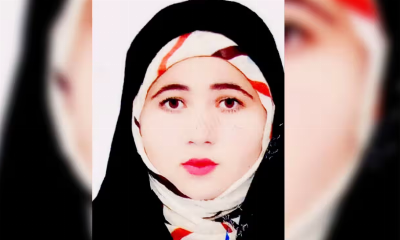Share
Human Rights Voices
While the UN devotes its human rights operations to the demonization of the democratic state of Israel above all others and condemns the United States more often than the vast majority of non-democracies around the world, the voices of real victims around the world must be heard.
Afghanistan, June 25, 2024
Afghan girls accuse Taliban of sexual assault after arrests for ‘bad hijab’
Original source
Teenage girls and young women arrested by the Taliban for wearing “bad hijab” say they have been subjected to sexual violence and assault in detention.
In more than one case the arrests and sexual abuse that young women faced while in custody earlier this year led to suicide and attempted suicide, reporters from the Afghan news service Zan Times were told.
In one case, a woman’s body was allegedly found in a canal a few weeks after she had been taken into custody by Taliban militants, with a source close to her family saying she had been sexually abused before her death.
The UN say that many women were detained by the Taliban for “bad hijab” in December 2023 and January 2024, following a Taliban decree that women must cover themselves from head to toe, revealing only their eyes.
At the time the UN called the arrests “concerning” and girls and women told the Guardian they had been subjected to beatings and intimidation while in detention.
Now the girls and young women are coming forward to report that they also faced sexual violence and abuse by the Taliban police, with devastating consequences.
The family of 16-year-old Zahra* said she and another teenage girl were arrested in a shop in west Kabul in December 2023.
Her mother, Somaia*, says Zahra and her friend were detained for two weeks before being released. When she came home, Zahra was “not the girl who had left home two weeks before”.
“I ran and hugged her, but she cried and said, ‘I am dishonoured.’ For the rest of that day, Zahra didn’t eat or talk,” her mother said.
“She only sat in a room and cried. I couldn’t dare to ask about what had happened,” she said.
Amina*, a 22-year-old medical student, said she spent three nights in a Taliban prison after being arrested in January 2024. She said she was interrogated by an older man who asked her about her menstruation and whether she was married or not.
“I fell at his feet and begged him, ‘Please, kill me but don’t harass me’,” she said. “He said: ‘Since you are keen to die, I will kill you, but before that, let us have fun with you.’
“Then he started touching my private parts,” Amina said. “I fainted twice during the interrogation, but every time, he poured cold water over my head.”
Amina said what happened to her happened to every girl taken to that interrogation room and left alone with the man.
“[Now] I can’t sleep at night, I am so scared, and every time I see the Taliban soldiers, I faint,” she said. “I have tried to kill myself twice.
“Once I took all of my mother’s medication, but my family took me to hospital. Every time I remember that they touched me, I can’t bear living,” Amina said.
For Zahra, the ordeal she said she had faced in prison proved too much for her to bear, her family said.
“In the middle of the night I woke up and noticed Zahra was not there. I woke up my husband and we started looking for her in all the rooms.
“My husband found her dead body,” said Somaia. “She had hanged herself.”
Zahra’s death was not the only tragedy linked to the Taliban’s arrest of women over how they wore their hijab.
In December 2023, a 23-year-old university student from the same neighbourhood was also reportedly arrested by the Taliban.
Marina Sadat had been on her way to the Farabi Institute of Health Sciences, where she was studying midwifery, the only educational option available for women in the Taliban’s Afghanistan.
Twenty-two days later, people who know her family say her battered body was found inside a sack in a canal in Kabul’s Paghman district.
Zan Times reporters were told that she had been sexually abused. “It is just brutal that a young girl goes to university and her dead body comes home,” one interviewee told the journalists.
On 4 January a spokesman for the Taliban’s ministry of vice and virtue told the Associated Press that the women who were arrested “violated Islamic values and rituals and encouraged society and other respected sisters to go for bad hijab … [i]n every province, those who go without hijab will be arrested.”
After condemnation in Afghanistan and abroad, Zabihullah Mujahid, the Taliban spokesman, later denied that arrests over “bad hijab” had taken place.
In response to the allegations of sexual assault of young women in detention, a Taliban spokesman also denied there had been any arrests for “bad hijab” and said: “The issue of rape is not at all possible because there is not just one or two people [in the room with a prisoner] and when there are three people, such a crime would not happen …[this is] a very sensitive issue for the Taliban. I am sure such a thing did not happen.”
The reports of sexual violence and assault against women and girls in detention comes as the Taliban are expected to attend a UN conference on Afghanistan in Doha on 30 June, where the UN has confirmed that no Afghan women will participate and women’s rights will not be discussed.

